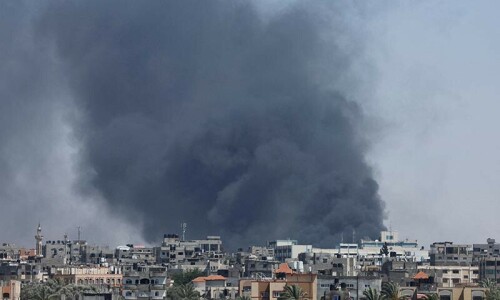According to the latest departmental report, Punjab has achieved its rice sowing target of 4.4m acres this year. But 70pc of this, some claim, has fallen into late-sown category due to harsh weather.
The wheat harvesting got late as wet weather hampered farming activity for more than three weeks, followed by a long hot and dry spell that gripped the province, eating into the time of nursery plantation, and subsequently sowing — extending the rice sowing process right into August.
Luckily, though by default, the late sowing has pushed the crop into a time-frame that Punjab Agriculture Department has long been advocating for; nursery plantation by June 1 and crop sowing by July 1. The departmental logic is that it would benefit the crop on two accounts: maximum advantage from the abundance of monsoon water and promoting basmati at the cost of coarse varieties.
How the crop behaves in this new time zone, and what benefits come to it because of delayed harvesting needs to be assessed and recorded
Taking a cue from the Indian experience, where Soil and Water Conservation Act 2009 has been enforced to the advantage of East Punjab farmers, the West Punjab also tried to push main life cycle of crop to the monsoon and save sub-soil water.
It has also proposed a similar law in order to legally equip itself for deciding sowing time of water-guzzling crops and also bound them into certain geographical zones to save water. Though still not finalised, the contours of the stipulated law remain almost similar to that of the Indian one.
The department thinks that if rice crop falls mainly into the monsoon spell, it would hugely save on sub-soil pumping. Most of the 1.2m tubewells in the province fall in rice districts of the central Punjab. These districts also receive over 600mm of rain each year during the rainy season.
The crop, which normally needs 48 inches of water in around 15 irrigation rounds, consumes around 17m acre of water — little less than three Tarbella dams. It is largely because the crop mainly matures either on canal or sub-soil water because of wrong timing of sowing.
Secondly, the department thinks that if sowing is delayed, it would automatically favour basmati variety. It flourishes when days are shortened and nights become longer in September. The coarse varieties, which are daylight neutral, can be sown and harvested at any time of the year. Both consume equal amount of water but their prices differ by more than 300pc. Apart from the natural advantage in basmati, it is more sustainable commercially and environmentally.
Punjab has not been able to enact the law because of opposition from certain quarters. How the crop behaves in this new time zone and what benefits come to it because of delayed harvesting needs to be assessed and recorded.
It would be hard to measure how much sub-soil water might be saved because that is a long process – but the Indian gained some water level in three to four years. If the province is still able to harvest 3.5m tonnes despite exceptional delay in sowing, the department might have a point.
No doubt water has become critical in any new agricultural planning. Every drop of it has to be saved because the planet including Pakistan, is fast loosing the resource. But apart from direct water saving that the department is trying to make through shifting the sowing time, it also needs to develop varieties of seeds that need less water.
To make the case for new seed variety more compelling is the fact that all current varieties of basmati have lost vitality and strength.
The rice belt falling on the borders between India and Pakistan regularly falls prey to rust, which, according to some farmers and scientists, is cross border pest invasion.
Published in Dawn, Economic & Business, August 25th, 2014














































Dear visitor, the comments section is undergoing an overhaul and will return soon.